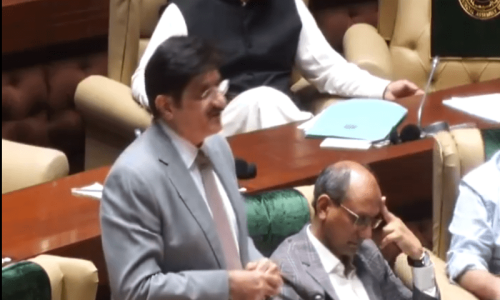KARACHI: At least 40pc of the city’s population is exposed to highly polluted air while 65pc residents live in areas with elevated levels of noise pollution, pointed out a researcher while sharing findings of his study at an international conference which opened at the Karachi University (KU) on Wednesday.
Titled ‘Urban ecology and frontiers of sustainable development’, the five-day conference has been organised by the Society for Urban Ecology (SURE), South Asia chapter and KU’s Department of Geography.
Giving a presentation on a study based on the assessment of human exposure to traffic-borne problems in Karachi, Dr Salman Zubair, assistant professor at KU’s geography department, explained that air pollution, an inherent by-product of the combustion process from vehicular traffic, was a serious threat to human health and had been accountable for 4pc deaths and 0.6pc burden of diseases across the globe.
“Our study showed that all traffic-generated problems are strongly associated with areas having high road density. The area intensely affected due to air pollution is just 5pc of the total area of Karachi. But, since the area is the city’s central part, it has high road and population density,” he said, while mentioning names of towns with high level of air pollution.
Polluted air had more serious health impact than noise pollution since hazardous particles remained suspended in the air for a long time, he added.
In another presentation on a study that has explored changes in land use along the west bank of Malir River covering a period from 2005 to 2013, Dr Anila Kausar said the results of the study suggested that there was a dire need to improve water availability and related infrastructure in the area.
“Poor standards of literacy, lack of governance and investment also adversely affect development of agriculture in this region,” she said.
Other subjects covered in the technical sessions included urban environment and stress, ecological city and urban sustainable development; a case study of Karachi, urban development in the eastern Hindu Kush, assessment of change in slum areas and its ecological impact on Karachi, and urban ecosystem services assessment in Romania.
Earlier, Prof Salman Qureshi from Humboldt University, Berlin, in his keynote speech spoke about urban ecology in detail and said that megacities of South Asia needed urban planning since living conditions in these areas were not good. Fifty-two per cent area of Mumbai consisted of slums.
Prof Cristian Ioja from the University of Bucharest, Romania, Prof Jamil Kazmi and KU Vice Chancellor Prof Mohammad Qaiser also spoke in the inaugural session.
Published in Dawn, January 19th, 2017














































Dear visitor, the comments section is undergoing an overhaul and will return soon.